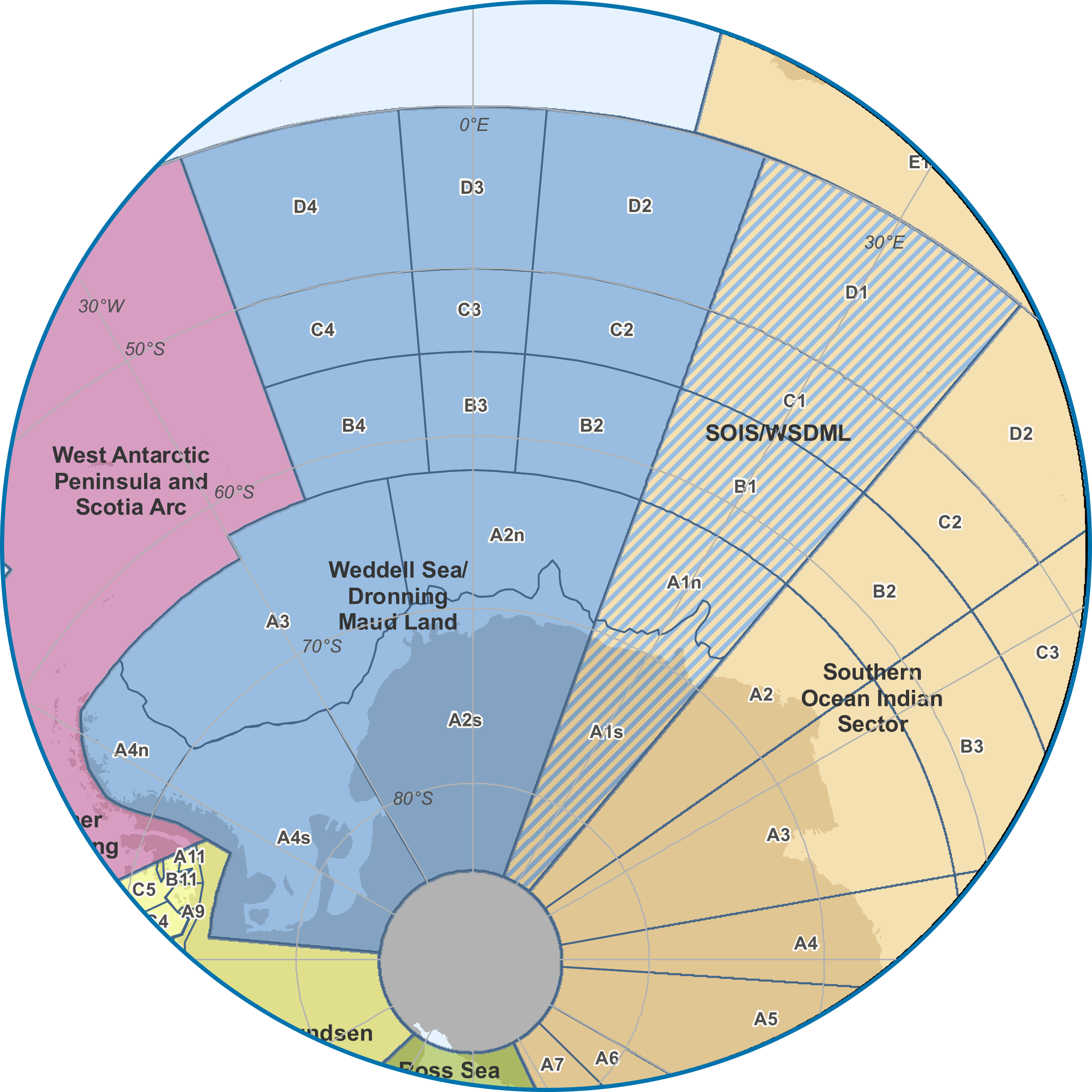Weddell Sea and Dronning Maud Land (WSDML)
Regional Working Group

The complex environment of the Weddell Sea and Dronning Maud Land (WSDML) is characterized by pronounced seasonality, circumpolar currents, deep-water formation and multi-year sea-ice cover. The Weddell Gyre connects water masses in the Antarctic Circumpolar Current with the ice shelf- and sea ice-shaped southern Weddell Sea waters. While the Antarctic Peninsula shows accelerated ice shelf mass loss, the eastern regions are still relatively stable but warming and ice-shelf loss is expected there in the future. Motivated by the region’s global importance, extensive multi-disciplinary observational programmes aim at monitoring ocean properties and understanding the relevant processes such as on-shelf heat transport, ice shelf-ocean interaction, and heat and CO2 uptake.
The Weddell Sea and Dronning Maud Land Regional Working Group will facilitate coordinated and standardized observational studies of major physical, chemical and biological variables including their drivers and interactions. This refers to a regional but also a circum-Antarctic approach. The WSDML working group will contribute to an increase in quality of the science output, and strengthen the awareness of the relevance of research in the WSDML sector of the Southern Ocean through international projects contributing to the SOOS.
The working group is open for involvement to anyone working in the Weddell Sea and Dronning Maud Land region. Click the button below to receive updates and further relevant information about the SOOS WSDML Regional Working Group.
Open Leadership Positions
There are currently open positions on the WSDML RWG leadership team. For more information click here...
Loading Products
Loading Events
Loading Products

Objectives
The SOOS WS-DML WG aims to fulfil the following terms of reference. To see the full terms of references please click here.
-
Develop and enable regional-scale observing using SOOS best practice for observing systems, including areas from which data sets already exist, to detect long-term changes.
-
Identify physical, geochemical and biological key processes and their coupling in areas of the WS-DML region under climate change as well as in presently stable areas expected to experience warming and melting of sea-ice in the future.
-
Identify and assemble key legacy data sets and sampling techniques.
-
Provide best practice sampling protocols to enable the standardization of measurements.
-
Based on the experience in the region, identify data gaps and bottlenecks in the observation systems that hinder a comprehensive understanding of the physical, geochemical and biological systems.
-
Facilitate coordinated and, where possible, multi-disciplinary observations.
-
Make plans of operations available on the SOOS website to increase collaboration amongst the international community.
-
Facilitate procedures to achieve data availability across the science community according to SOOS data policy, which includes the publication of data and meta-data.
-
Convene focussed sessions at international meetings, including SCAR, SCOR and their scientific initiatives, and facilitate synthesis products, to increase the awareness of the science community to the importance of the Weddell Sea – Dronning Maud Land region. Also joint events with the International Arctic Science Committee (IASC) on polar comparative observations and analysis as well as should be supported.
-
Provide support to the International Program Office (IPO) by providing short reports to be available at the SOOS SSC annual meeting, as well as providing content for the IPO website/newsletters on the activities and outcome.
-
Contribute to international initiatives assessing the state of the SO, especially with reference to climate change, pollution and the exploitation of natural resources.
-
Support stakeholders with scientific information, especially the initiative to develop an MPA; support the MPA management plan after its endorsement.
Leadership
Contributing Modelling and Field Activities
Last modified: 20/Feb/2024/JB






